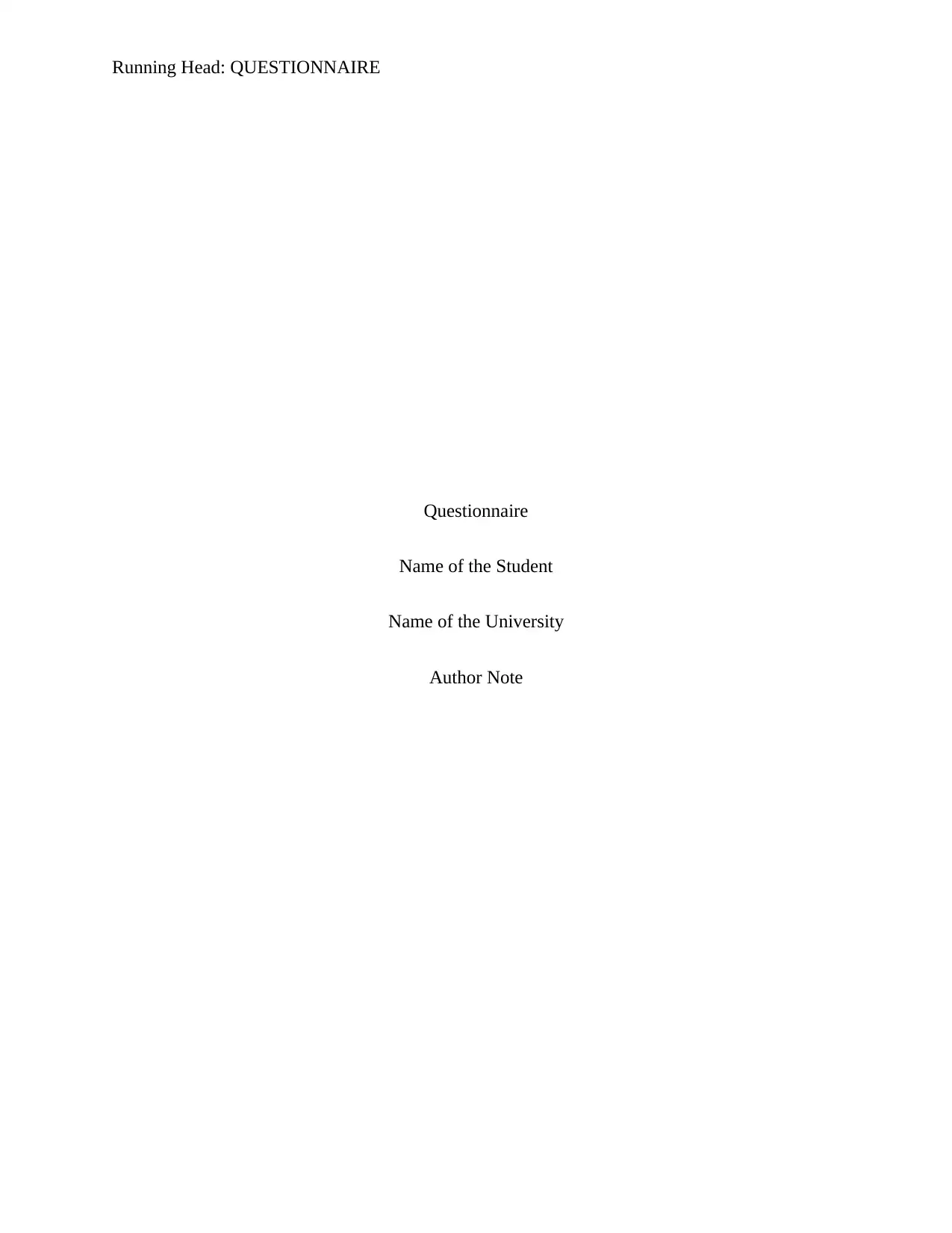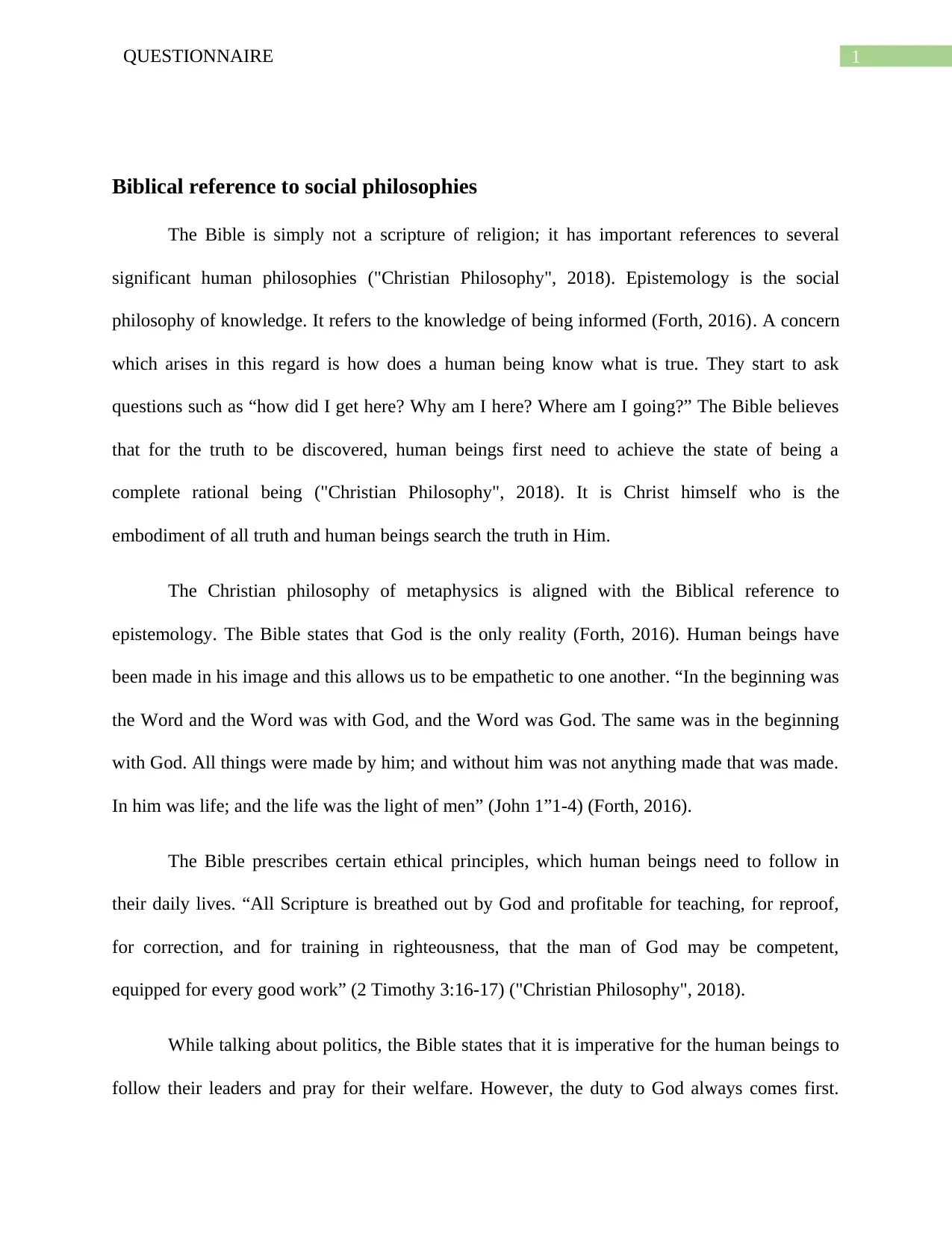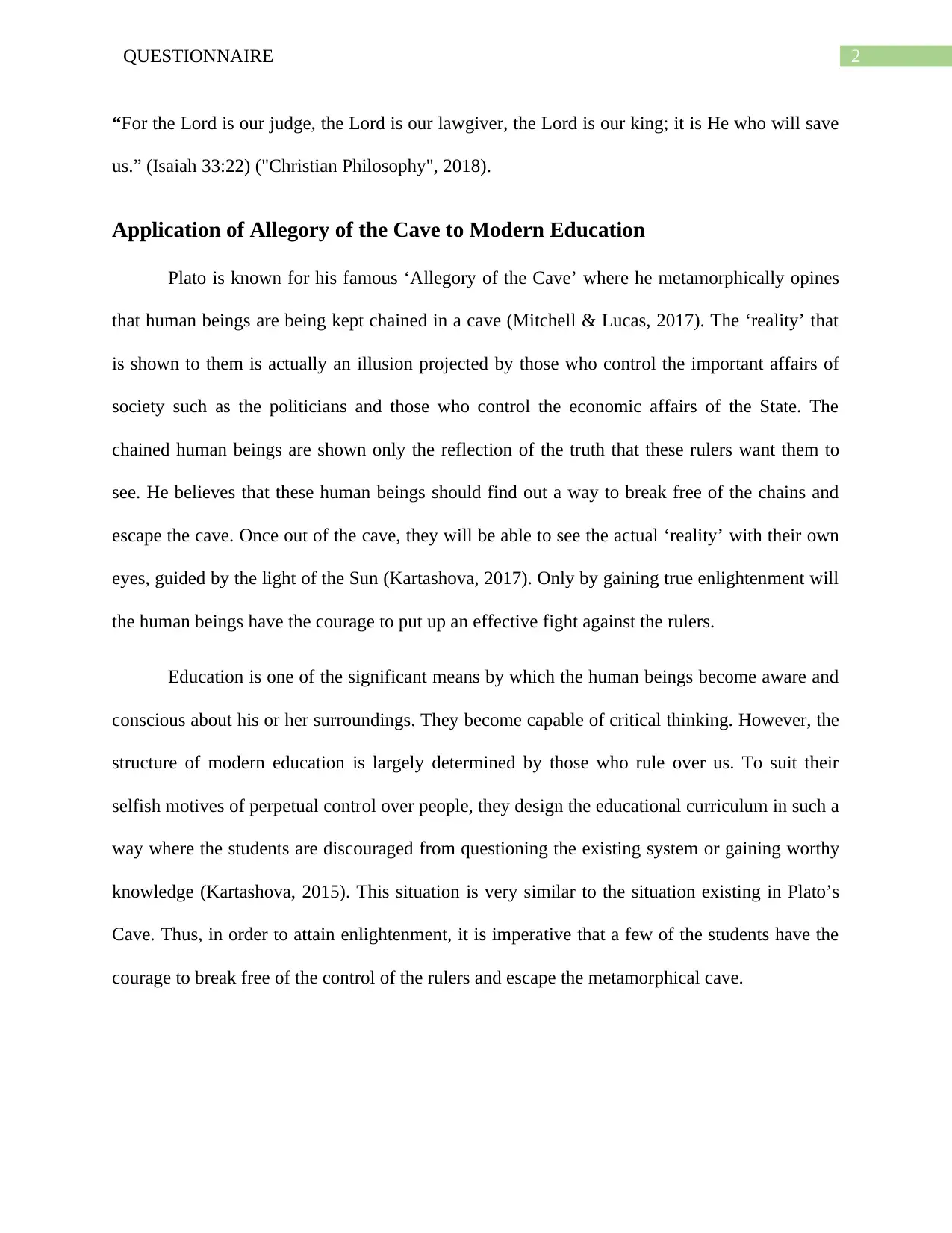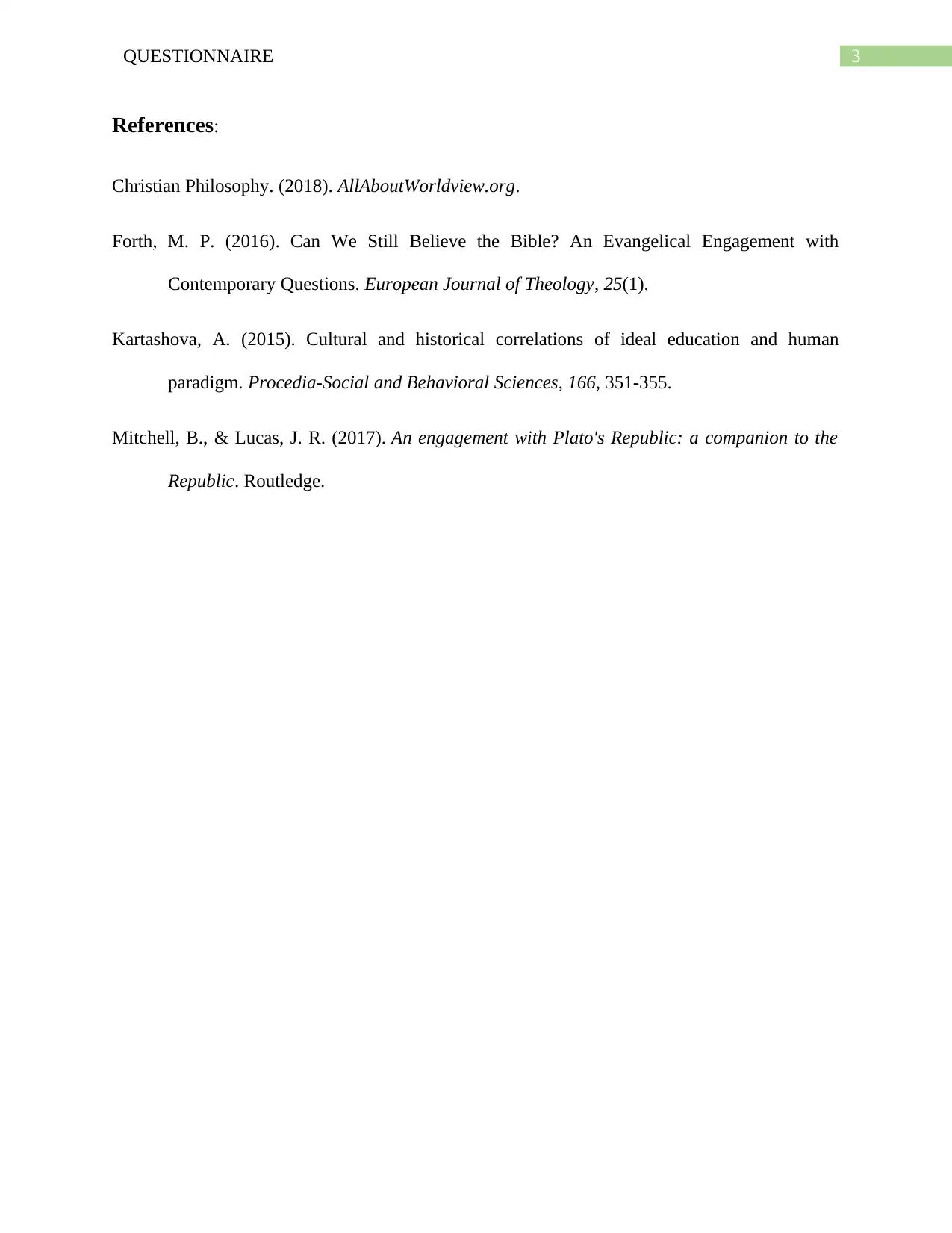Questionnaire on Biblical Social Philosophies and Allegory of the Cave
VerifiedAdded on 2023/05/30
|4
|858
|156
Essay
AI Summary
This essay explores the intersection of Biblical social philosophies and Plato's Allegory of the Cave. It delves into epistemology, metaphysics, ethics, and political philosophy from a Biblical perspective, highlighting the importance of rationality, truth-seeking, and ethical conduct. The essay then applies Plato's Allegory of the Cave to modern education, arguing that the current system, influenced by those in power, often presents a distorted view of reality, hindering critical thinking and genuine enlightenment. The author emphasizes the need for students to break free from these metaphorical chains to attain true awareness and challenge the status quo. The essay concludes by referencing various academic sources to support its analysis.

Running Head: QUESTIONNAIRE
Questionnaire
Name of the Student
Name of the University
Author Note
Questionnaire
Name of the Student
Name of the University
Author Note
Paraphrase This Document
Need a fresh take? Get an instant paraphrase of this document with our AI Paraphraser

1QUESTIONNAIRE
Biblical reference to social philosophies
The Bible is simply not a scripture of religion; it has important references to several
significant human philosophies ("Christian Philosophy", 2018). Epistemology is the social
philosophy of knowledge. It refers to the knowledge of being informed (Forth, 2016). A concern
which arises in this regard is how does a human being know what is true. They start to ask
questions such as “how did I get here? Why am I here? Where am I going?” The Bible believes
that for the truth to be discovered, human beings first need to achieve the state of being a
complete rational being ("Christian Philosophy", 2018). It is Christ himself who is the
embodiment of all truth and human beings search the truth in Him.
The Christian philosophy of metaphysics is aligned with the Biblical reference to
epistemology. The Bible states that God is the only reality (Forth, 2016). Human beings have
been made in his image and this allows us to be empathetic to one another. “In the beginning was
the Word and the Word was with God, and the Word was God. The same was in the beginning
with God. All things were made by him; and without him was not anything made that was made.
In him was life; and the life was the light of men” (John 1”1-4) (Forth, 2016).
The Bible prescribes certain ethical principles, which human beings need to follow in
their daily lives. “All Scripture is breathed out by God and profitable for teaching, for reproof,
for correction, and for training in righteousness, that the man of God may be competent,
equipped for every good work” (2 Timothy 3:16-17) ("Christian Philosophy", 2018).
While talking about politics, the Bible states that it is imperative for the human beings to
follow their leaders and pray for their welfare. However, the duty to God always comes first.
Biblical reference to social philosophies
The Bible is simply not a scripture of religion; it has important references to several
significant human philosophies ("Christian Philosophy", 2018). Epistemology is the social
philosophy of knowledge. It refers to the knowledge of being informed (Forth, 2016). A concern
which arises in this regard is how does a human being know what is true. They start to ask
questions such as “how did I get here? Why am I here? Where am I going?” The Bible believes
that for the truth to be discovered, human beings first need to achieve the state of being a
complete rational being ("Christian Philosophy", 2018). It is Christ himself who is the
embodiment of all truth and human beings search the truth in Him.
The Christian philosophy of metaphysics is aligned with the Biblical reference to
epistemology. The Bible states that God is the only reality (Forth, 2016). Human beings have
been made in his image and this allows us to be empathetic to one another. “In the beginning was
the Word and the Word was with God, and the Word was God. The same was in the beginning
with God. All things were made by him; and without him was not anything made that was made.
In him was life; and the life was the light of men” (John 1”1-4) (Forth, 2016).
The Bible prescribes certain ethical principles, which human beings need to follow in
their daily lives. “All Scripture is breathed out by God and profitable for teaching, for reproof,
for correction, and for training in righteousness, that the man of God may be competent,
equipped for every good work” (2 Timothy 3:16-17) ("Christian Philosophy", 2018).
While talking about politics, the Bible states that it is imperative for the human beings to
follow their leaders and pray for their welfare. However, the duty to God always comes first.

2QUESTIONNAIRE
“For the Lord is our judge, the Lord is our lawgiver, the Lord is our king; it is He who will save
us.” (Isaiah 33:22) ("Christian Philosophy", 2018).
Application of Allegory of the Cave to Modern Education
Plato is known for his famous ‘Allegory of the Cave’ where he metamorphically opines
that human beings are being kept chained in a cave (Mitchell & Lucas, 2017). The ‘reality’ that
is shown to them is actually an illusion projected by those who control the important affairs of
society such as the politicians and those who control the economic affairs of the State. The
chained human beings are shown only the reflection of the truth that these rulers want them to
see. He believes that these human beings should find out a way to break free of the chains and
escape the cave. Once out of the cave, they will be able to see the actual ‘reality’ with their own
eyes, guided by the light of the Sun (Kartashova, 2017). Only by gaining true enlightenment will
the human beings have the courage to put up an effective fight against the rulers.
Education is one of the significant means by which the human beings become aware and
conscious about his or her surroundings. They become capable of critical thinking. However, the
structure of modern education is largely determined by those who rule over us. To suit their
selfish motives of perpetual control over people, they design the educational curriculum in such a
way where the students are discouraged from questioning the existing system or gaining worthy
knowledge (Kartashova, 2015). This situation is very similar to the situation existing in Plato’s
Cave. Thus, in order to attain enlightenment, it is imperative that a few of the students have the
courage to break free of the control of the rulers and escape the metamorphical cave.
“For the Lord is our judge, the Lord is our lawgiver, the Lord is our king; it is He who will save
us.” (Isaiah 33:22) ("Christian Philosophy", 2018).
Application of Allegory of the Cave to Modern Education
Plato is known for his famous ‘Allegory of the Cave’ where he metamorphically opines
that human beings are being kept chained in a cave (Mitchell & Lucas, 2017). The ‘reality’ that
is shown to them is actually an illusion projected by those who control the important affairs of
society such as the politicians and those who control the economic affairs of the State. The
chained human beings are shown only the reflection of the truth that these rulers want them to
see. He believes that these human beings should find out a way to break free of the chains and
escape the cave. Once out of the cave, they will be able to see the actual ‘reality’ with their own
eyes, guided by the light of the Sun (Kartashova, 2017). Only by gaining true enlightenment will
the human beings have the courage to put up an effective fight against the rulers.
Education is one of the significant means by which the human beings become aware and
conscious about his or her surroundings. They become capable of critical thinking. However, the
structure of modern education is largely determined by those who rule over us. To suit their
selfish motives of perpetual control over people, they design the educational curriculum in such a
way where the students are discouraged from questioning the existing system or gaining worthy
knowledge (Kartashova, 2015). This situation is very similar to the situation existing in Plato’s
Cave. Thus, in order to attain enlightenment, it is imperative that a few of the students have the
courage to break free of the control of the rulers and escape the metamorphical cave.
⊘ This is a preview!⊘
Do you want full access?
Subscribe today to unlock all pages.

Trusted by 1+ million students worldwide

3QUESTIONNAIRE
References:
Christian Philosophy. (2018). AllAboutWorldview.org.
Forth, M. P. (2016). Can We Still Believe the Bible? An Evangelical Engagement with
Contemporary Questions. European Journal of Theology, 25(1).
Kartashova, A. (2015). Cultural and historical correlations of ideal education and human
paradigm. Procedia-Social and Behavioral Sciences, 166, 351-355.
Mitchell, B., & Lucas, J. R. (2017). An engagement with Plato's Republic: a companion to the
Republic. Routledge.
References:
Christian Philosophy. (2018). AllAboutWorldview.org.
Forth, M. P. (2016). Can We Still Believe the Bible? An Evangelical Engagement with
Contemporary Questions. European Journal of Theology, 25(1).
Kartashova, A. (2015). Cultural and historical correlations of ideal education and human
paradigm. Procedia-Social and Behavioral Sciences, 166, 351-355.
Mitchell, B., & Lucas, J. R. (2017). An engagement with Plato's Republic: a companion to the
Republic. Routledge.
1 out of 4
Related Documents
Your All-in-One AI-Powered Toolkit for Academic Success.
+13062052269
info@desklib.com
Available 24*7 on WhatsApp / Email
![[object Object]](/_next/static/media/star-bottom.7253800d.svg)
Unlock your academic potential
Copyright © 2020–2026 A2Z Services. All Rights Reserved. Developed and managed by ZUCOL.




